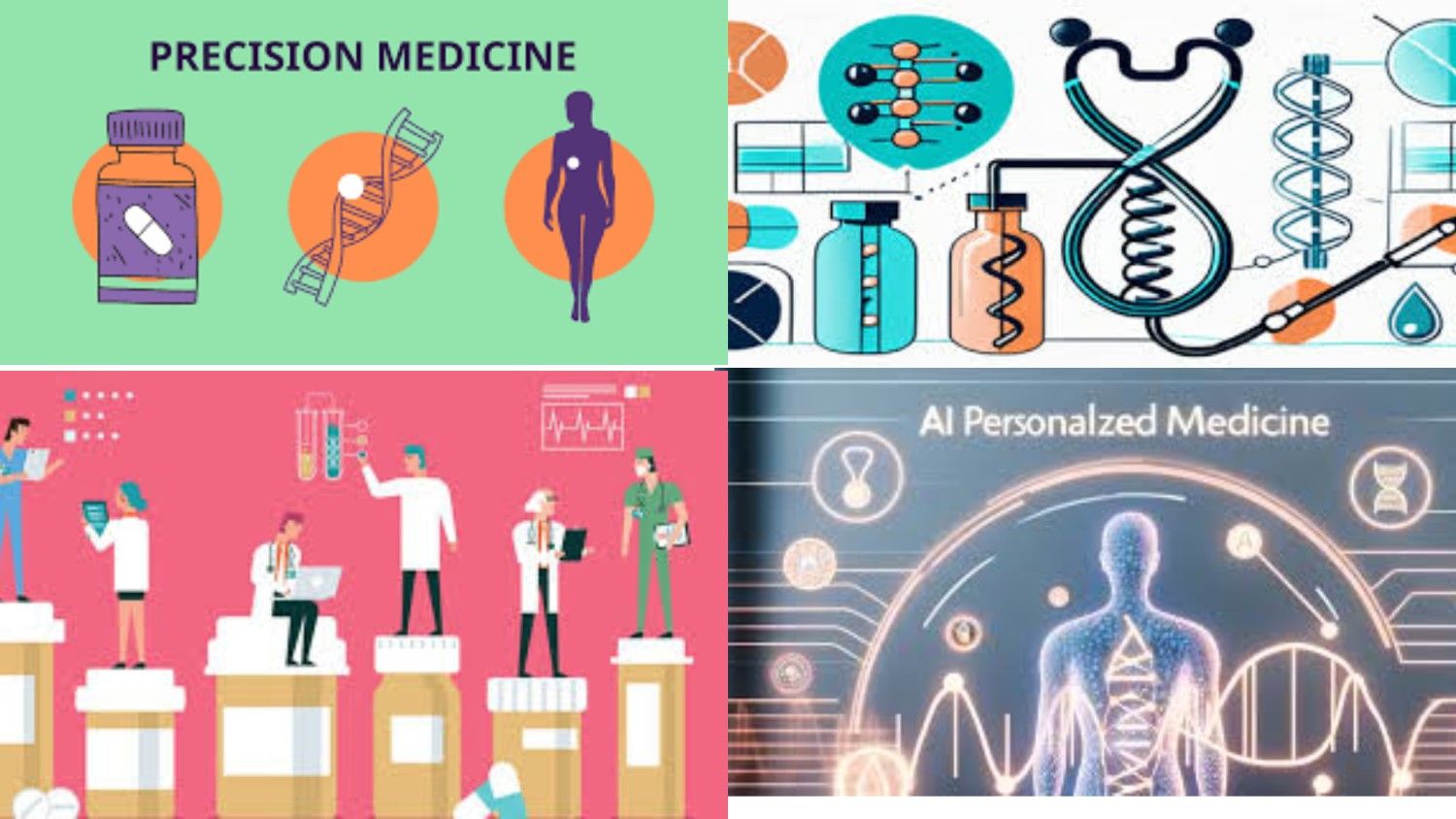- 1 What is personalized medicine?
- 2 The Role of Genetics in Personalized Medicine
- 3 Benefits of Personalized Medicine
- 4 How Personalized Medicine Works
- 5 Examples of Personalized Medicine in Action
- 6 The role of technology in personalized medicine
- 7 Personalized Medicine and Preventive Healthcare
- 8 Challenges and Ethical Considerations
- 9 The Future of Personalized Medicine
- 10 How to Get Started with Personalized Medicine
- 11 Conclusion: Transforming Healthcare, One Genome at a Time

The healthcare sector is revolutionizing itself, abandoning the old “one-size-fits-all” approach and adopting personalized medicine. Using genetic information, personalized medicine tailors treatments, preventive measures, and lifestyles for each patient according to their unique genetic makeup.
In this detailed guide, we shall discuss the concept of personalized medicine, its benefits, the role of genetics, and how it is shaping the future of healthcare. Whether you are a patient or simply an inquisitive and interested citizen, “get in the know” to take charge of your health.
What is personalized medicine?
Personalized medicine, also known as precision medicine, is an approach to healthcare that involves understanding an individual’s genetic, environmental, and lifestyle factors to tailor treatments and interventions. As a developed version of generalized treatments, it focuses on every patient’s needs.
Key Features of Personalized Medicine:
- It uses genetic testing to understand individual traits.
- It provides different treatment options based on individual needs with increased effectiveness.
- Prevention takes priority because the focus is on discovering genetic risk factors.
- Unlike traditional treatment, which seems to target only the symptoms uniformly, personalized medicine targets the root causes specific to a person.
The Role of Genetics in Personalized Medicine
Genetics has become the heart of personalized medicine. Your DNA is like your blueprint regarding your biological makeup, holding crucial information about your susceptibility to diseases, how you metabolize drugs, and even how you might respond to certain treatments.
How Genetic Information is Applied:
- Disease Prediction: Possible genetic predispositions to diabetes, cancer, or heart disease
- Drug Response: Better drugs would respond to one’s genetic profile.
- Risk Assessment: Find out your inherited risks for diseases by analyzing your family genetic studies.
- Your genetic profile can be used by healthcare providers to arrive at more informed decisions in order to optimize your treatment and prevention plans.
Benefits of Personalized Medicine
Personalized medicine has several advantages over traditional treatments. The approach is more effective and patient-centric.
Key Advantages
- Improved treatment outcome: targeted therapies raise the chances of success.
- Fewer Side Effects: Treatments are formed to fit an individual’s biology, minimizing adverse side effects.
- Disease Detection at its Earliest Stage: Genetic testing helps detect disease before symptoms become apparent.
- Economical Care: By selectively administering treatment, unnecessary procedures, and medications are eliminated from practice.
- Empowered Patients: They better understand their health and participate in the development of their care plans.
How Personalized Medicine Works
Personalized medicine uses sophisticated technologies and data analysis to provide targeted health care. This is how it works most of the time.
a. Genetic Testing
Genetic testing is offered to the patients, usually with saliva swabs or blood tests. These results give an overview of the DNA variations that can impact health.
b. Data Analysis
Healthcare providers study genetic information along with environmental and lifestyle exposures to infer risks and determine the most appropriate interventions.
c. Customized Treatment Program
A customized treatment or prevention program that may include drugs, therapies, or lifestyle changes is developed based on the assessment.
Examples of Personalized Medicine in Action
Personalized medicine is truly making significant strides in numerous medical fields. Here are some notable examples:
a. Cancer Treatment
In oncology, targeted therapies are used to treat specific types of cancer based on the genetic profile of the tumor. Treatments like HER2 inhibitors for breast cancer are examples of this approach.
b. Cardiovascular Health
Genetic tests can determine how patients metabolize drugs such as blood thinners. This ensures that they are prescribed the correct dosage to prevent complications.
c. Pharmacogenomics
This is the branch that focuses on how genes affect a response to drugs and therefore optimizes plans for medication for depression or epilepsy, chronic pain, and various other conditions.
d. Rare Genetic Disorders
For conditions such as cystic fibrosis or sickle cell anemia, personalized approaches can vastly improve quality of life by targeting underlying genetic anomalies.
The role of technology in personalized medicine
Technological advances are beginning to spur the development of personalized medicine, which means very specific diagnostics and treatments.
Precise Healthcare Enabled by Emerging Technologies
Genome sequencing Decodes an individual’s genetic blueprint into actionable insights.
AI/Machine Learning: Analyzes huge data sets looking for patterns or ways to predict outcomes
Wearable Devices: Records real-time health metrics, providing personalized feedback.
CRISPR Technology: The latter is meant to correct genetic mutations through editing genes.
These technologies are not only improving patient care but also opening the gates for some groundbreaking discoveries in the field of medicine.
Personalized Medicine and Preventive Healthcare
Personalized medicine holds a lot of promises through which it highlights prevention. Genetic risks can be detected early on, allowing an individual to work proactively on reducing the possible effects that may arise due to these factors.
Preventive Strategies:
- Lifestyle Modifications: Adapt diet, exercise, and habits to reduce the risk factors.
- Regular Screenings: Monitor for early signs of conditions you’re genetically predisposed to.
- Targeted Supplements: Address specific deficiencies or support body functions based on genetic insights.
- Preventive personalized medicine empowers individuals to maintain their health and reduce the likelihood of serious conditions developing.
Challenges and Ethical Considerations
While the potential of personalized medicine is immense, it’s not without challenges. Ethical, financial, and accessibility concerns must be addressed to ensure equitable healthcare.
Key Challenges:
- Privacy and Data Security: Any information related to genetics is sensitive.
- High Costs: Genetic testing and personalized treatment can be very costly.
- Access to such healthcare systems or even regions is not uniform.
- Questions about discrimination against the genetically differently equipped and consent issues in genetic testing still abound.
- Efforts are underway that will help make all the advantages of personalized medicine available to people across the board.
The Future of Personalized Medicine
The future of personalized medicine is full of promise; continual advances in technology and research point towards:
Emerging Trends
Integrative Approaches
Genetics combined with the study of the microbiome and epigenetics for a complete understanding of health.
Telemedicine Integration
Telemedicine in the consultation process to create personalized care plans
Gene Therapies
Disease could be treated at the source, i.e., treating the genetic condition.
Wider Accessibility
Personalized medicine made it more affordable and accessible to many more around the world.
As more individuals adopt this approach, healthcare will become increasingly efficient and tailored to individual needs.
How to Get Started with Personalized Medicine
If you’re interested in exploring personalized medicine, here are a few steps to get started:
Steps for Beginners:
- Research Providers: Look for clinics or healthcare providers specializing in personalized medicine.
- Undergo Genetic Testing: Choose a reputable service to get your genetic profile analyzed.
- Consult a Specialist: Work with a doctor or genetic counselor to interpret your results.
- Adopt Changes Gradually: Begin with simple lifestyle modifications based on genetic insights.
- Remember, personalized medicine is a journey, and incremental steps can lead to significant improvements over time.
Conclusion: Transforming Healthcare, One Genome at a Time
Personalized medicine is the new face of health care, offering customized care with individualized needs and genetic profiles. Focus on prevention, improved treatment efficacy, and the use of state-of-the-art technology provide a groundbreaking model that redefines the way the industry approaches delivering medical care.
Whether you are trying to optimize your health or need to address a specific condition, personalized medicine empowers you to make informed decisions about your well-being. As we embrace this innovative approach, the future of healthcare looks brighter, healthier, and more personal than ever.








